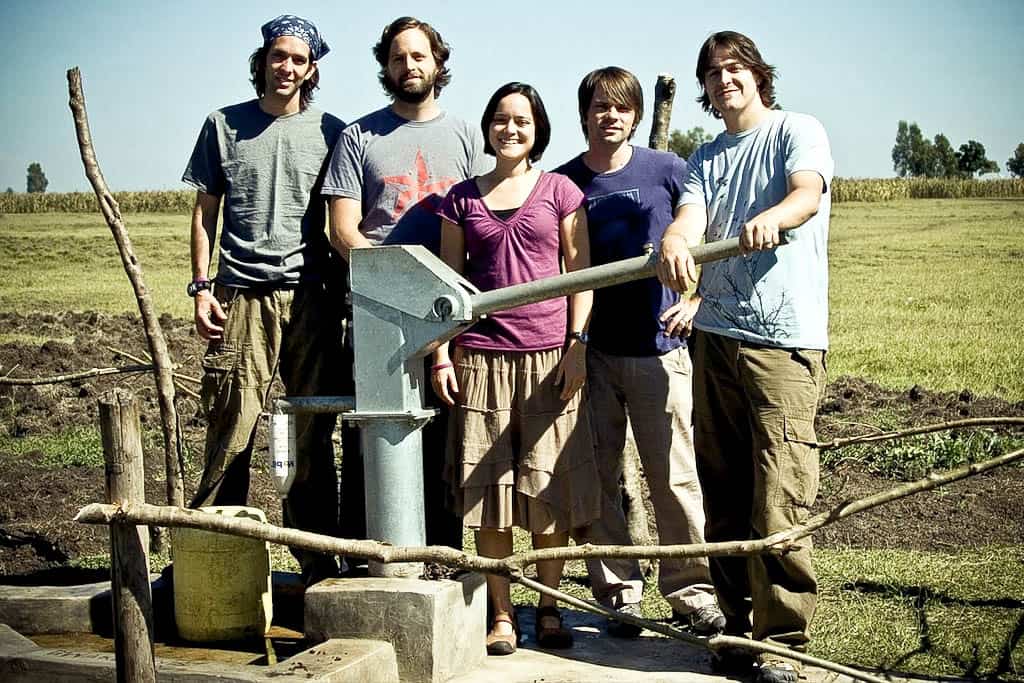It’s been a number of years now, but this story continues to remind us why our work goes beyond just helping Africans, and what our underlying desire is to see through these partnerships.
Our band and Co-Founder Jena Nardella were doing community visits in the Kono region outside of Kisumu, Kenya. Each day, we would spend a few hours with organized groups within the small villages—hearing stories of their health, needs, hopes and ideas. Some of these villages had applied for a clean water well and were going through the prep stages of pooling resources and funds to buy some required supplies upfront. Others had recently received a bore-hole well through a Blood:Water partner, and were experiencing the presence of clean water for the first time in the history of the village.
For the most part, the groups of villagers are organized by women—matriarchs, mother’s, wives, caretakers of the community. They have realized over time that they can accomplish much more if they band together—combining their voices and resources. This particular village had just received a clean-water well after months of patience and hard work. Dorkas was appointed the spokeswoman of this group—she was about 60 years old, persistent and determined. For months on end, she would walk miles to plead to our partners in Kisumu to bring a well to their community. Dorkas knew that the presence of a well would drastically change daily life in the Kono region; not that she would work less, but that instead of burning half a day walking many kilometers to fetch dirty river water, she could focus on things that mattered- caring for the sick, getting the children to school, micro-finance.
We got to sit and listen to Dorkas share her victory after many months of patience and hard work had paid off—the well was just a few months old. She was quick to list off the health benefits—no more parasites or waterborne illnesses, children were in school instead of fetching water, diarrhea was not taking the lives of young children anymore. She reported huge changes in the life of the village. We were amazed at the major changes in the lives of these diligent women. They each had roles of responsibility regarding the well- they knew how to repair it themselves should something clog or break. They collected a small fee from outside villagers that came in to fetch clean water. It is a sustainable system based on ownership and empowerment. Villages are not reliant on someone like Blood:Water to come back and fix things should the well fall into disrepair.
Then Dorkas got quiet, her tone changed, and her eyes lit up. “And look at my skin,” as she proudly stroked her arm. “It is no longer cracked and dry. I feel young and beautiful, and a village elder recently asked me out on a date.” She laughed heartily and as we shared in her joy, our eyes instantly brimming with tears. For the first time in far too long, Dorkas felt her beauty as a woman. This is the “WHY” of our work. The health and lifestyle changes are reason enough to partner with African organizations, and it’s a big step in short-circuiting the cycle of poverty and the myth of uselessness. But dignity is the bedrock- necessary in building hope, recognizing the desire for common human flourishing, and seeing others as worthy, creative, strong, even beautiful. Dorkas will always be a reminder of this building block of Blood:Water- when we start to feel like a machine asking for donations to provide a needed service, Dorkas reminds us that it’s about seeing Africans as neighbors and working that they may not just survive, but to actually thrive as men and women with unique gifts, dreams, and beautiful things to offer this world.
This Saturday is World Water Day. I hope you can find a minute to reflect on the necessity of safe water, both in your home and in a place so seemingly far away as Dorkas’ village in Kono, Kenya.
Thank you for joining Blood:Water as we partner with Africans to end the HIV/AIDS and water crises!
More Stories:
Categories

